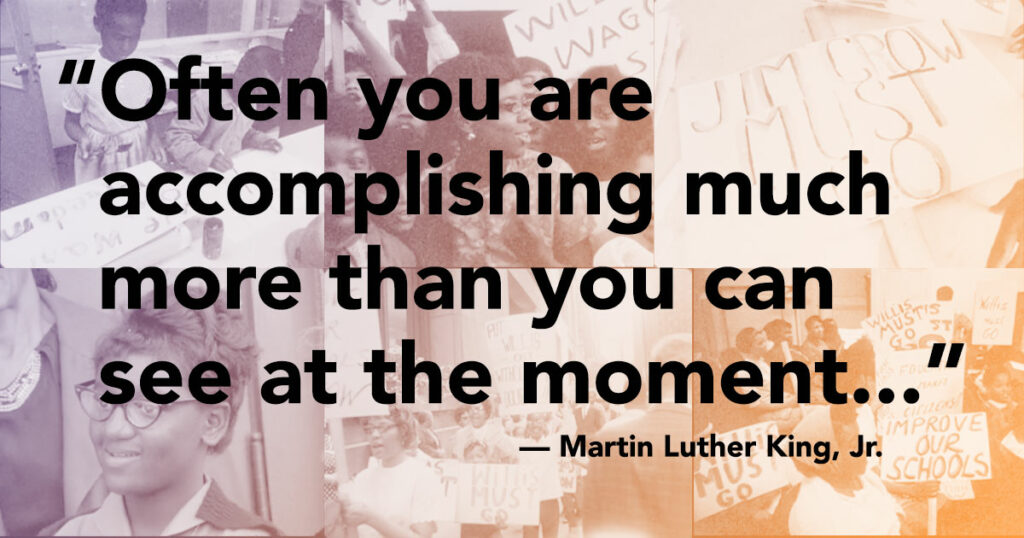Blog
MLK’s Advice to a Student Activist

“Often you are accomplishing much more than you can see at the moment because you are in the heart of the situation…”
While the popular media narrative today—and at the time—posed the problem of segregation and racial inequality in the 1960s as a largely Southern problem, northern cities like Chicago, New York, and Boston were among the worst offenders.
For the civil rights movement in Chicago, public schools were front and center. The school board, under Superintendent Benjamin Willis, took the occasion of a massive increase of Black families moving to Chicago to further segregate Chicago’s public education system. As Erin Blakemore describes it:
Many schools were so crowded that students had to attend in shifts; by 1960, up to 33,000 black students only attended school for four hours a day so that their schools could accommodate all their enrolled students. Auditoriums, basements, cafeterias and even hallways became classrooms. Supplies were at a premium.
Schools that served majority-Black student populations were underfunded and overcrowded, with many in unsanitary conditions. Instead of sending Black students to neighboring white-majority schools, to alleviate overcrowding Willis hauled in aluminum trailers to act as temporary classrooms. These trailers, known derisively as “Willis Wagons,” symbolized the segregation imposed on Chicago residents.
In 1963, young people and adults organized a historic, massive student strike of Chicago Public Schools. On Tuesday, October 22, more than 200,000 students stayed home from school, with tens of thousands of them and allies marching in the streets in protest.
’63 Boycott – Today is Freedom Day from Kartemquin Films on Vimeo.
Despite the strike and additional actions in its aftermath, Willis remained superintendent for another three years, and no immediate policy changes were made to alleviate the city’s segregated education system.
In July 1966, Martin Luther King, Jr. was interviewed on a radio call-in show in Chicago. King had recently moved there to help lead the Chicago Freedom Movement, in significant part due to the inspiring organizing and actions that local community organizers had accomplished in the previous several years. A young caller expressed disappointment that her own actions the previous summer—recruiting friends, marching, getting arrested during civil disobedience — had not accomplished much in her eyes, and wondered if it was worth it. “I really can’t see… what was tangible, you know, that we’ve done,” she said.
He reminded her that, “if there hadn’t been a movement last summer, the conditions in the schools would continue, without anybody raising a question or raising a voice against it.”
It’s worth listening to his entire response, but this statement should ring true for all who have committed themselves to the hard work of grassroots organizing: “Often you are accomplishing much more than you can see at the moment because you are in the heart of the situation.”
Such a sentiment is also easily applied to King himself: for the last few years of his life he was widely reviled by the mainstream press and, according to opinion polls, a majority of Americans. Chicago would prove to be one of the most difficult terrains on which he worked: during a housing march in city’s Gage Park, King commented that he had never seen — even in the deep South — such a violent white mob attacking marchers. But what King and countless unsung organizers accomplished could only be truly understood with the passage of time: he did not live to see many of the seeds he had planted, and the present-day struggles for racial and education justice in Chicago and across the country build off the sacrifices made many decades ago.
Chicago remains one of the most segregated cities in the country, and scored only 36% on our Loving Cities Index, but the spirit of resistance and resilience is still strong. When a dozen Chicago parents went on a hunger strike in 2015 to stop the closure of Dyett High School—and succeeded!—their efforts too will be felt in the years and struggles to come.
Watch what two of those hunger strikers, Journey for Justice Alliance National Director Jitu Brown and Irene Robinson, parent organizer for the Kenwood-Oakland Community Organization learned from their action:


